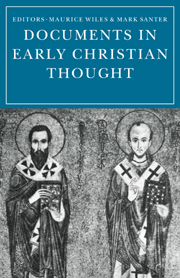8 - SACRAMENTS
Published online by Cambridge University Press: 17 August 2009
Summary
We now turn to the sacraments: Baptism and the Eucharist. The meaning of the sacraments was intimately bound up with the understanding of the Church in the thought of the Fathers. Thus, in the previous section, baptism was a central issue in the first two pieces and the Eucharist was an important theme in the last. Here our concern is more specifically with what the Fathers thought was going on in the rites themselves.
The first passage, from Tertullian, comes from the earliest treatise on baptism known to us. Already, at the beginning of the third century, one notices points of confusion and ambiguity that were to cause trouble in the further development of Western thinking on Christian initiation. Was the gift of the Holy Spirit to be associated with the actual baptism, with the anointing that immediately followed it, or with the imposition of the bishop's hand which followed that? Did one of these views necessarily exclude another? At one point Tertullian seems to say one thing, at another something else.
Baptism was normally administered during the Easter vigil, and was immediately followed by the Easter Eucharist, at which the newly baptized received communion for the first time. The five sermons addressed to the newly baptized by Cyril of Jerusalem in the middle of the fourth century (or possibly by his successor John some years later) give a vivid impression both of these ceremonies themselves and of the Church's reflection on their meaning.
- Type
- Chapter
- Information
- Documents in Early Christian Thought , pp. 172 - 201Publisher: Cambridge University PressPrint publication year: 1975



